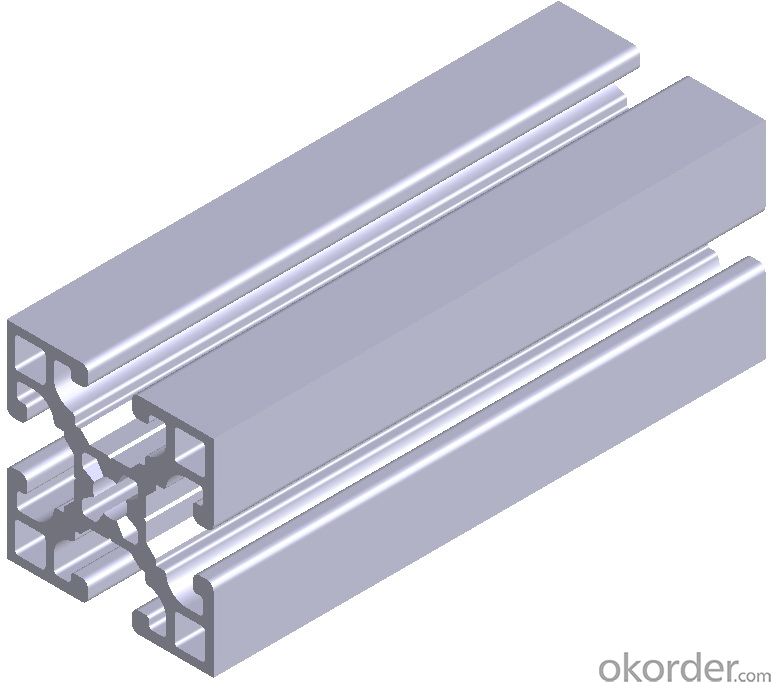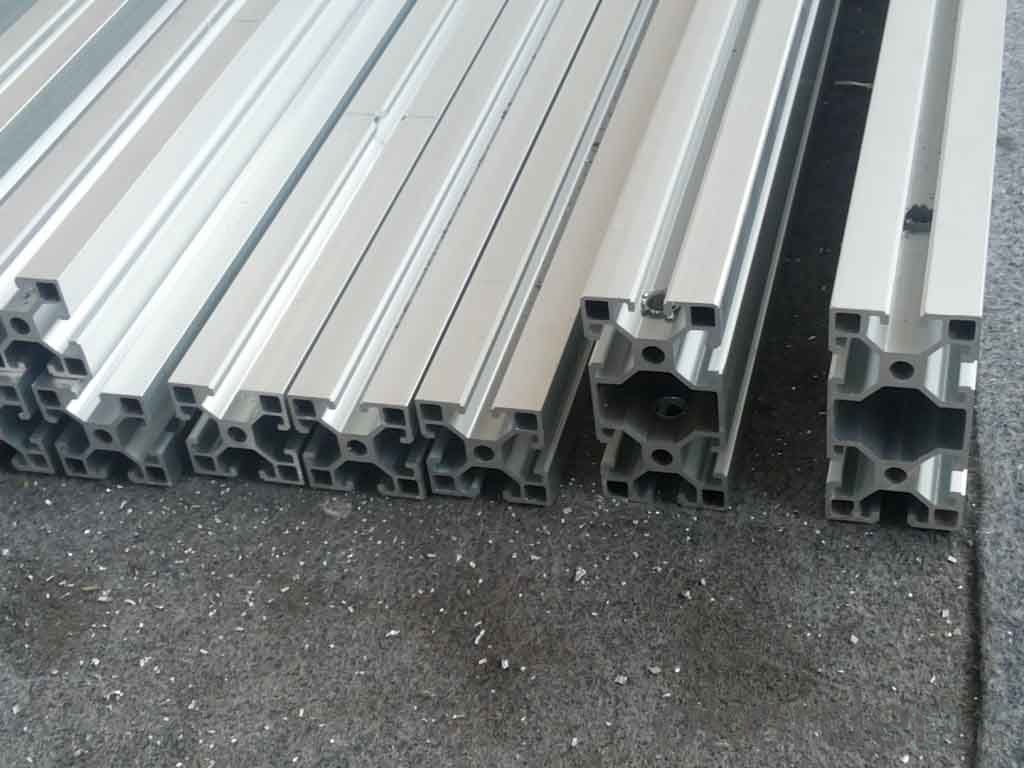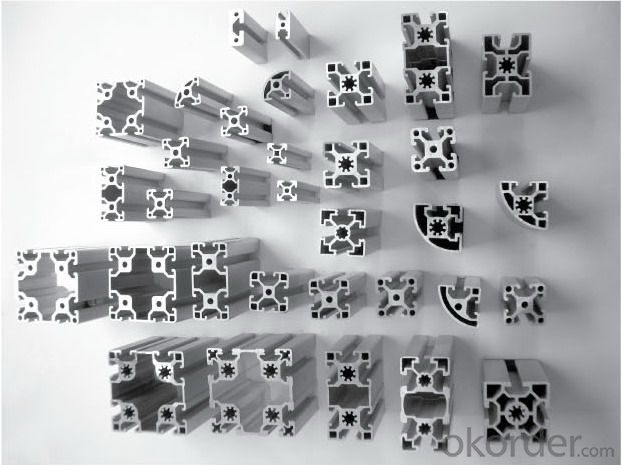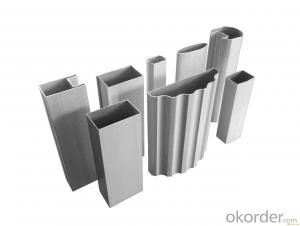6063 Aluminum Alloy Aluminium Profile Extrusion
- Loading Port:
- Shanghai
- Payment Terms:
- TT OR LC
- Min Order Qty:
- 20 m.t.
- Supply Capability:
- 2000 m.t./month
OKorder Service Pledge
OKorder Financial Service
You Might Also Like
1.Structure of 6063 Aluminum Alloy Aluminium Profile Extrusion Description:
6063 Aluminum Alloy Aluminium Profile Extrusion (also spelled anodising, particularly in the UK and Australia) is an electrolytic passivation process used to increase the thickness of the natural oxide layer on the surface of metal parts. Anodized aluminium surfaces, for example, are harder than aluminium but have low to moderate wear resistance that can be improved with increasing thickness or by applying suitable sealing substances.
2.Main Features of the 6063 Aluminum Alloy Aluminium Profile Extrusion:
High corrosion-resistance;
weather-resistance;
heat-resistance;
alkali-resistance and impact-resistance properties.
3.6063 Aluminum Alloy Aluminium Profile Extrusion Images:



4.6063 Aluminum Alloy Aluminium Profile Extrusion Specification:
1. Material: 6063,6061,6060,6005,6005A,etc.
2. Temper: T5 or T6
3. Finish: Mill finish, anodizing, powder coating, electrophoresis, wooden transfer or pvdf/carbon-flouride coated, polishing, brushing, sand blasting
4. Various colors: Silver, bronze, black, gold, blue, grey, champagne, bright, etc.
5. Machining: Cutting, punching, drilling, tapping, milling, bending, welding, CNC etc.
5.FAQ:
①How about your company?
A world class manufacturer & supplier of castings forging in carbon steel and alloy steel,is one of the large-scale professional investment casting production bases in China, consisting of both casting foundry forging and machining factory. Annually more than 8000 tons Precision casting and forging parts are exported to markets in Europe, America and Japan. OEM casting and forging service available according to customer’s requirements.
②How to guarantee the quality of the products?
We have established the international advanced quality management system,every link from raw material to final product we have strict quality test;We resolutely put an end to unqualified products flowing into the market. At the same time, we will provide necessary follow-up service assurance.
- Q:aluminum foil production of ERP software, requiring a comprehensive production process, and have special assistance to pre operation, the best price is reasonable
- Baidu, Inc., a China military there, here not to send.
- Q:I would like to know because I'm getting a sword with an aluminum sheathe.
- No, it is a very soft metal. However for a sheath it will likely be fine, unless you intend on practicing using the sheath for blocking as some Samurai used it for.
- Q:How do aluminum coils compare to other types of coils (e.g., copper)?
- Aluminum coils generally have a lower cost compared to copper coils, making them a more budget-friendly option. However, copper coils tend to have better heat transfer properties and are more durable, which can result in improved system performance and longer lifespan. The choice between aluminum and copper coils depends on factors such as budget, desired efficiency, and specific application requirements.
- Q:Aluminum roll, which companies are used?
- Too many things that you can see every day, with all the things that are made of aluminum, and the companies that make these aluminum products are useful, so it's unclear!
- Q:Can aluminum coils be used in wastewater treatment plants?
- Yes, aluminum coils can be used in wastewater treatment plants. Aluminum coils are commonly used in the construction of heat exchangers, which are essential components in wastewater treatment plants. Heat exchangers are used to transfer heat from the wastewater to the treatment process, helping to optimize the treatment efficiency and reduce energy consumption. Aluminum coils are preferred in some cases due to their excellent thermal conductivity, lightweight, and resistance to corrosion, making them suitable for the harsh environment of wastewater treatment plants. Additionally, aluminum coils are cost-effective and have a long lifespan, making them a reliable choice for use in wastewater treatment facilities.
- Q:What type of equipment is used to process aluminum coils?
- The equipment used to process aluminum coils varies depending on the specific manufacturing process and requirements. However, some common types of equipment used in aluminum coil processing include: 1. Uncoilers/Decoilers: These machines are used to unwind and straighten the aluminum coils, allowing for further processing. 2. Levelers: Leveling machines are used to flatten the aluminum coil's surface, ensuring that it is flat and even before further processing. 3. Slitters: Slitting machines are utilized to cut the aluminum coil into narrower strips of desired widths. This equipment is often used in industries like automotive, construction, and packaging. 4. Shears: Shearing machines are used to cut the aluminum coil into specific lengths or shapes required for the manufacturing process. 5. Roll Forming Equipment: Roll forming machines are used to shape the aluminum coil into specific profiles or designs. This equipment is commonly used in the construction industry for manufacturing roofing panels, gutters, and siding. 6. Heat Treatment Furnaces: Heat treatment furnaces are used to subject the aluminum coil to specific temperature conditions to enhance its strength, hardness, or other desired properties. 7. Surface Treatment Equipment: Equipment such as cleaning machines, chemical baths, and coating lines are used for surface treatment processes like cleaning, anodizing, or painting the aluminum coil to improve its appearance, corrosion resistance, or other functional properties. 8. Packaging Equipment: Packaging machines are used to bundle, wrap, or pack the processed aluminum coils for storage, transportation, or further distribution. It is important to note that the specific equipment used may differ depending on the size, thickness, alloy, and intended use of the aluminum coils. Manufacturers often employ customized equipment to meet their specific requirements and ensure efficient processing.
- Q:What is the typical thermal conductivity of aluminum coils?
- The typical thermal conductivity of aluminum coils is approximately 205-220 W/mK. Aluminum is known for its excellent thermal conductivity, making it a popular choice for heat transfer applications such as in HVAC systems, refrigeration, and heat exchangers. The high thermal conductivity of aluminum allows for efficient heat dissipation and transfer, ensuring optimal performance and energy efficiency in these systems.
- Q:Can aluminum coils be used for sound insulation purposes?
- No, aluminum coils are not typically used for sound insulation purposes.
- Q:Is aluminum veneer the same as color coated aluminum coil?
- Not necessarily, but you may call it like this. Aluminum veneer is the panel processed by aluminum plant. It has different size and thickness according to customer’s requirements. Color coated aluminum coil has been coated through two processes of bake and roast, for example, the coil or sheet formed of the coating of cars.
- Q:Are there any restrictions on the coil flatness of aluminum coils?
- Yes, there are restrictions on the coil flatness of aluminum coils. The industry standards specify acceptable tolerances for coil flatness to ensure the quality and usability of the aluminum coils. These restrictions help prevent any deformation or irregularities in the coils, ensuring they meet the required specifications for various applications.
1. Manufacturer Overview |
|
|---|---|
| Location | |
| Year Established | |
| Annual Output Value | |
| Main Markets | |
| Company Certifications | |
2. Manufacturer Certificates |
|
|---|---|
| a) Certification Name | |
| Range | |
| Reference | |
| Validity Period | |
3. Manufacturer Capability |
|
|---|---|
| a)Trade Capacity | |
| Nearest Port | |
| Export Percentage | |
| No.of Employees in Trade Department | |
| Language Spoken: | |
| b)Factory Information | |
| Factory Size: | |
| No. of Production Lines | |
| Contract Manufacturing | |
| Product Price Range | |
Send your message to us
6063 Aluminum Alloy Aluminium Profile Extrusion
- Loading Port:
- Shanghai
- Payment Terms:
- TT OR LC
- Min Order Qty:
- 20 m.t.
- Supply Capability:
- 2000 m.t./month
OKorder Service Pledge
OKorder Financial Service
Similar products
New products
Hot products
Hot Searches
Related keywords






























